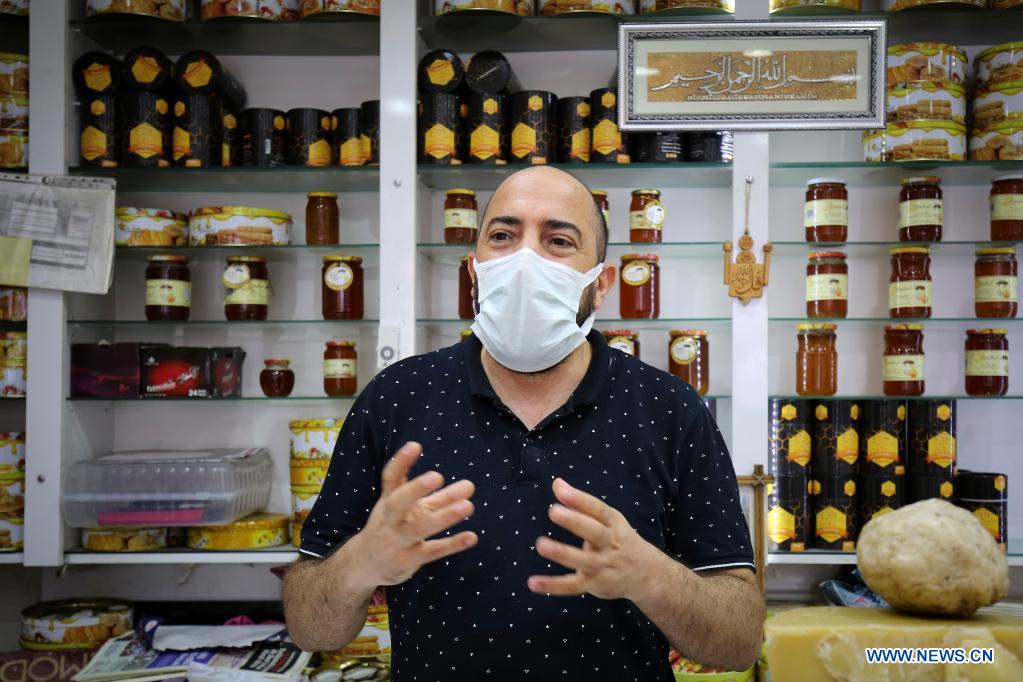
Omer Habib, a 40-year-old Algerian refugee who came to Istanbul six years ago with his wife and child, talks to reporters at his shop in Istanbul, Turkey, on Aug. 18, 2021. Turkey is home to over 4 million refugees, including 3.6 million Syrians, according to official figures. However, experts believe the number is much higher when considering undocumented migrants. (Photo by Serkan/Xinhua)
by Zeynep Cermen
ISTANBUL, Aug. 20 (Xinhua) -- It was an ordinary day in one of the central commercial districts of Istanbul filled with numerous shops of all kinds, with a stream of people lingering and shopping.
Several customers were lining up in front of a small shop for Syrian desserts, while a couple was waiting for a barista to grind some coffee beans at a nearby kiosk.
A majority of the shops in this market zone of the Fatih district on the European part of Istanbul belong to refugees, mostly Syrians, who flocked to the city with the dream of living better.
Mahir, 57, is one of them. He arrived in Istanbul in 2015 with his family of four, fleeing from the civil war in Syria.
"For a person in my age, it was difficult to leave the entire history behind. I left my country with too many memories. Sometimes I feel sad," Mahir, who wanted to be identified by his first name, spoke of his sentiments about his past to Xinhua.
After arriving in the city, he opened a shop for mobile phone accessories with all his savings.
The family does not plan to return to their hometown, satisfied with their life in Istanbul. "People here in Fatih do not make us feel like strangers or refugees. We are like brothers here," Mahir noted.
Istanbul Mayor Ekrem Imamoglu announced Tuesday that the population of Turkey's largest city has reached 20 million with a growing number of refugees.
"Istanbul's population, which was 10 million in 1999, has reached 20 million today," Imamoglu said. "Istanbul has never been exposed to such uncontrolled growth in its history."
In 2020, official figures put the city's population at 15.46 million.
Turkey is home to over 4 million refugees, including 3.6 million Syrians, according to official figures. However, experts believe the number is much higher when considering undocumented migrants.
The vast majority of these migrants, including Syrians, Afghans, Iraqis, Iranians, and many from countries in Africa, are in Istanbul, Turkey's financial and cultural hub.
Imamoglu stated that refugees constituted 20 percent of the population, with the potential to change the city's demographic features.
"We must work on how to rehabilitate these people, how to provide humane living conditions, how to protect children and women," the mayor noted, calling on all parties to discuss the matter urgently.
Didem Isci, a researcher at Ankara's Social Sciences University, said the huge ratio could indeed lead to a significant demographic change in the city, which has received a considerable amount of migrants beyond its capacity.
"Istanbul residents at certain socioeconomic levels are more confronted with the refugee problem than any other Turkish people," Isci told Xinhua, referring to the impact on local incomes.
Labor prices are declining, as migrants provide cheap labor and thus intensify competition with Turkish workers, while rents are rising due to increased demand, Isci explained.
"The high number of refugees also leads to a ghettoization," Isci said. "The quality and the content of the service provided by local municipalities change, from childcare assistance to landscaping, everything is affected."
Omer Habib, a 40-year-old Algerian refugee, came to Istanbul six years ago with his wife and child. The couple have two children now.
"When I first visited Istanbul in 2003, I liked it very much. People were very kind, living a beautiful life, going to work and having a good time at home with their families," he told Xinhua at a bee products shop where he works.
"But there is a huge difference between then and now. It is very crowded now, and problems arise among communities with different nationalities," Habib said.
In Isci's view, the refugee issue in the country should not turn into violence against immigrants.
"Authorities should focus on preventing the use of violence against them, which is unacceptable under all circumstances," said Isci, who cautioned against the growing anti-refugee sentiment among Turkish people. Enditem




